Performance management is the process of a manager and their direct reports agreeing on a set of goals, as well as how the employee should be measured against targets. It’s key that the goals are SMART (Specific, Measurable, Achievable, Realistic, and Timely).
Managing employees performance is of great importance to any business. It can increase employee engagement and therefore improve business processes and outcomes.
When it comes to businesses reviewing their process – there are two main questions to ask and consider – Is performance management happening in your business?, and is the current process working effectively?
Hold Regular one-to-ones to get performance management right
Ensuring that there is an ongoing exchange about performance amongst managers and their direct reports is key to any business. We often find that most companies have some form of procedure in place to check-in with employees and ensure they are achieving goals and objectives. However it’s usually on an annual basis.
There are issues with assessing performance only once per year. This is because feedback is not given in real-time, and it doesn’t provide sufficient opportunities for employees to improve. There is also little actionable feedback provided. Any underperformance or behaviour issues has already gone on too long and have probably been overlooked. All of which is ineffective for your company and can have a negative impact on your employees’ performance.
In addition, we encourage exchanging feedback on performance on a regular basis. At the very least once a month. Including regular discussions as part of your performance management procedure is a great way to keep the lines of communication open. Having regular discussions with your team gives you and your employees an opportunity to discuss any pressing concerns either of you may be facing. It’s also an opportunity to discuss recent successes and potential barriers from stopping any successes. Furthermore, this will provide you with a snap shot of performance and also provide feedback in real-time.
Establish objectives and key results
A good and efficient way to improve performance and make it easier to manage, is by linking individual’s contributions to the company priorities and business goals. Alongside the business goals, a set of objectives and key results should be established against each employee as part of your performance management efforts. This should also be specific and personalised to their role within the business. This allows employees to see for themselves how their efforts are making an impact on goal execution which helps improve results. With a measured way of tracking progress, managers can assess performance on an ongoing basis.
Invest in your management team
All managers should be focused on improving their employees’ strengths and weaknesses through coaching. To be good coaches, managers should keep performance feedback focused on the future as much as possible. Punishing for past mistakes or underperformance doesn’t facilitate future development. Therefore, they should be treated as lessons learned for the future. Effective coaches use performance management techniques such as offering frequent, specific feedback about what employees can do to start improving right now. To ensure that your managers are coaching their teams, encourage them to ask questions such as “What are you going to get done this week?” And, “What do you need from me?”.
Gone are the days where you sit down with people only once a year and discuss performance. This needs to be an ongoing discussion, where regular conversations take place about performance management, giving effective feedback on the things they’re doing well, and the things they need to work on. And if your business objectives change, do you need to realign their individual goals and objectives?
Our advice for any business would be to invest in your management team so they can inspire your employees. This will also help them to understand the importance of representing your business. We offer management training and workshops (full day and half day) on managing performance, handling difficult conversations, personal development and much more.
Contact Us
If you would like more information on performance management, get in-touch. If you would also like us to help you put a plan in place, please contact us.







